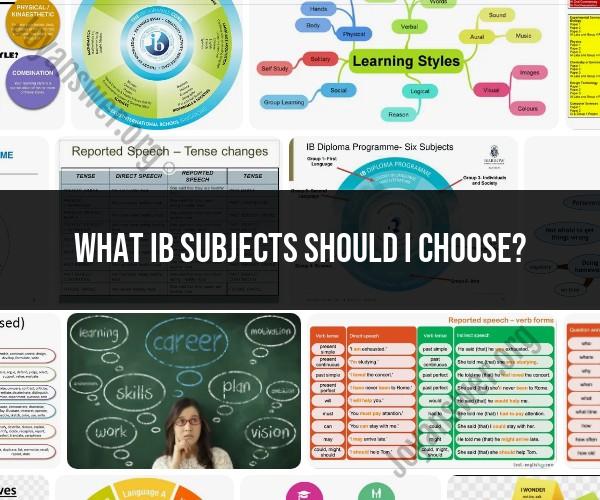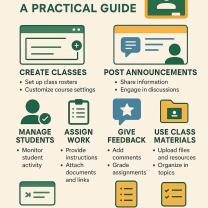What IB subjects should I Choose?
Selecting the right International Baccalaureate (IB) subjects should be based on your interests, academic strengths, and future educational or career goals. The IB program offers a range of subjects in six different groups, and students typically choose one subject from each of these groups. Here are some considerations to help you choose your IB subjects:
1. Group 1: Language and Literature:
- This group typically includes your native language or a language in which you are highly proficient. You may have the option to choose different levels (e.g., Language and Literature HL, SL, or Language A Literature HL, SL).
- Choose a language and level that you enjoy and excel in.
2. Group 2: Language Acquisition:
- In this group, you'll study a second language. You can choose from various languages at different levels, including Language B (if you're not fluent) and Language Ab Initio (for beginners).
- Consider your interest in learning a new language and any future language requirements for university or career aspirations.
3. Group 3: Individuals and Societies:
- This group includes subjects like History, Geography, Economics, Psychology, and others. Choose a subject that aligns with your interests in social sciences or humanities.
- Consider how the subject relates to your career goals or future major if you have one in mind.
4. Group 4: Sciences:
- Options in this group include Biology, Chemistry, Physics, Environmental Systems and Societies, and more. Choose a science subject that you enjoy and are comfortable with.
- Consider your future academic or career path; some programs or fields may require specific science subjects.
5. Group 5: Mathematics:
- You'll typically choose from Mathematics Analysis and Approaches or Mathematics Applications and Interpretation. The former is more focused on theoretical math, while the latter is more practical.
- Choose a level that matches your mathematical aptitude and future academic or career requirements.
6. Group 6: The Arts, Electives, or Additional Sciences:
- In this group, you have flexibility to choose from a variety of subjects, including the arts (Visual Arts, Music, Theatre), a second subject from Groups 2, 3, or 4, or other electives.
- Consider your personal interests and how this subject complements your overall IB course selection.
7. Consider HL vs. SL:
- Some subjects offer both Higher Level (HL) and Standard Level (SL) options. HL subjects are more in-depth and may be required or preferred by universities for certain programs.
- Choose HL subjects in areas where you have a strong interest and feel confident in your abilities.
8. Balance and Manageability:
- Ensure that your chosen subjects provide a balanced workload that you can manage effectively. IB can be challenging, so don't overload yourself with too many difficult subjects.
9. University and Career Goals:
- Consider the university programs or careers you're interested in. Some universities have specific subject requirements, and certain careers may benefit from particular subject combinations.
10. Seek Advice:- Talk to your school's IB coordinator, teachers, and current IB students for guidance and insights into the subjects and workload.
Ultimately, your IB subject choices should reflect your interests, strengths, and aspirations. Remember that the IB program is designed to provide a well-rounded education, so don't be afraid to explore different subjects and broaden your knowledge.
Choosing IB Subjects: A Guide to International Baccalaureate
The International Baccalaureate (IB) Diploma Programme is a two-year college preparatory program that is offered in over 5,000 schools around the world. The IB Diploma Programme is designed to be challenging and rigorous, and it is recognized by universities around the world.
One of the most important aspects of the IB Diploma Programme is the choice of subjects. Students must choose six subjects from six different subject groups:
- Group 1: Studies in Language and Literature
- Group 2: Language Acquisition
- Group 3: Individuals and Societies
- Group 4: Sciences
- Group 5: Mathematics
- Group 6: The Arts
Students must also choose three subjects at Higher Level (HL) and three subjects at Standard Level (SL). HL courses are more challenging and demanding than SL courses.
When choosing IB subjects, it is important to consider the following factors:
- Your interests: Choose subjects that you are interested in and that you are passionate about.
- Your strengths: Choose subjects that you are good at and that you enjoy learning about.
- Your future goals: Choose subjects that will prepare you for your future studies and career goals.
It is also important to consider the following factors when choosing IB subjects:
- Subject prerequisites: Some subjects have prerequisites that must be met before students can take them.
- Subject availability: Not all IB subjects are offered at all schools.
- Teacher recommendations: Talk to your teachers to get their recommendations for which subjects you should choose.
IB Subject Selection: Tailoring Your Curriculum to Your Goals
The IB Diploma Programme allows students to tailor their curriculum to their specific goals and interests. By choosing the right subjects, students can prepare themselves for a variety of future studies and career paths.
For example, students who are interested in studying medicine may choose to take IB subjects such as Biology, Chemistry, and Physics at HL. Students who are interested in studying law may choose to take IB subjects such as History, English Literature, and Economics at HL.
Students who are not sure what they want to study in the future can still choose IB subjects that will give them a broad and well-rounded education. For example, students could choose to take IB subjects from all six subject groups.
Charting Your IB Path: Navigating Subject Choices
Choosing IB subjects can be a daunting task, but it is important to remember that there is no right or wrong answer. The best way to choose IB subjects is to carefully consider your interests, strengths, and future goals.
It is also important to talk to your teachers and other advisors to get their guidance. They can help you to understand the different subject options and to choose the subjects that are right for you.
Here are some additional tips for choosing IB subjects:
- Do your research. Learn about the different IB subjects and what they entail.
- Talk to your teachers and other advisors. Get their guidance on which subjects to choose.
- Consider your interests, strengths, and future goals. Choose subjects that you are interested in, that you are good at, and that will prepare you for your future studies and career goals.
- Don't be afraid to change your mind. It is okay to change your mind about your IB subject choices. If you find that you are not enjoying a subject, you can talk to your advisor about switching to a different subject.
Choosing IB subjects is an important decision, but it is also an opportunity to create a curriculum that is tailored to your specific needs and goals.












